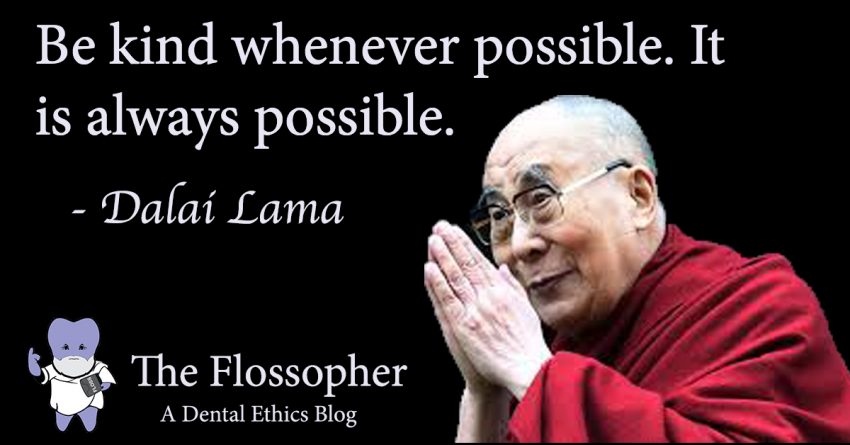This article will cover the metaethical foundations for kindness. We have to be carful not to confuse helping others or being nice with being moral. People help others do bad things and people are nice just to manipulate. This is being kind but not in any moral sense. A philosophical analysis will give a rational defense of kindness and understanding of its moral character.
Kindness
In a previous article (Why be a Good Dentist?), I explained that ethical commands must be universal and necessary for them to be absolutely obligatory. Universal so that all agents recognize and respect the obligation. Necessary so that one must follow the command, not just take it as a suggestion. Such conception of morality makes moral statements have real meaning instead of being bombastic.
Kant claims that all agents have a duty to help others (beneficence). He argued that since everyone sometimes needs help to fulfill their goals, one is obligated to help others when you universalize a maxim (contradiction of will test). If you think others should help you, you must recognize the same obligation to help others yourself.

While this is noble, many moral theorists point out the problems of extreme altruism and philantrophy. Aristotle pointed out that a “friend to all is a friend to none.” If a dentist spent all her time doing free work, her practice would fail. It appears there can be no categorical imperative to be kind. In a weaker reading of contradiction of thought (Kant’s second moral test), this point is very detrimental to Kant’s argument for beneficence. I will explain why this is an incorrect reading of Kant and defend the obligation of kindness.
Practical Reason
I explain in Intro to Dental Ethics that Kant’s second test (contradiction in thought) is rather vague. It is often phrased that if a practice cannot be physically done in a hypothetical world, the concept “destroys” itself. For example, one cannot physically give all her money to the poor because she will become poor herself. Her means (complete donation) actually “destroys” her ability to achieve her goal (ending all poverty), so it is claimed one cannot morally will donation at all as a universal standard.
This kind of reasoning is silly because most people just want to be charitable to a reasonable extent to those they can help (e.g., volunteering one a free dentistry day). Aristotle’s concern that we will be friends to all, is not even applicable. One may point out that the contradiction of thought test evaluates the idea or conception of an act as a legitimate moral practice.

John Rawls illustrates that a legitimate behavior gains it validity by following the rules of its governing practice. It’s not valid to charge money for dental services on a free dentistry day. The behavior of charity is legitimate only under the rules of the practice and to the scope of the practice. After a free dentistry day, a practice may start charging patients again. It becomes critical to determine which practices are legitimate as they dictate the rules of behaviors in question.
Why Kindness is a Legitimate Moral Practice
For a practice to be respected morally, it must apply universally (it must be taken as legitimate). This does not mean that when you donate, you must donate to all or everyone has to donate everything (Aristotle’s attack is avoided). You only have to evaluate the legitimacy of donation as a practice that applies to all using practical reason.
A practice is morally legatiemate if it is necessary for the function of the will (practical reason). To conceive of the contradiction of thought test as an evaluation of the physical impossibility of an action in a hypotechical world is meaningless. The will (i.e., the ability to “universalize” or apply rules to others) is foundational to all moral claims. Thus, a necessary condition for the will to function must be considered a legitimate practice absolutely.
Kant was right all along, but he needed some support. An agent sometimes needs the help of other agents as a means to some end. A will requires help sometimes, but doesn’t need to help others to function at all (Kant’s argument fails in a way). Philantrophy is valid under the practice of kindness, but the desire to be kind only comes to us sometimes. That in mind, we must understand kindness to be a legitimate practice because for human agency to take place at all, we must support each other as a community.

Summary
No man is an island, as they say. Humans start as children and only become functioning with the help of others. We are a product of our environment and so foundationally connected to community. I’m not sure what Kant had in mind but the reason to help others is not because we need help sometimes. The reason to be kind is that kindness is structurally foundational (necessary) to the functioning of the will and thus morality.
We must educate others because our will requires information to make decisions. We must be nice to others because through fortune does a will get its interests. We must share because humans only survive in a community. We must be kind.
Author
Dr. Vishnu Burla, DDS, BA Philosophy
Acknowledgements
I appreciate Alex Conley for our interesting conversation about Kant’s contradiction of thought that lead me to the development of ideas in this article.
Thanks to Dr. Webster and Maren for inspiring me to make this article about kindness.
Further Reading
Grounding of the Metaphysics of Morals by Immanuel Kant
The Highest Good: Respect for Humanity. Read why humanity is the most important good in the world.

Facebook Comments